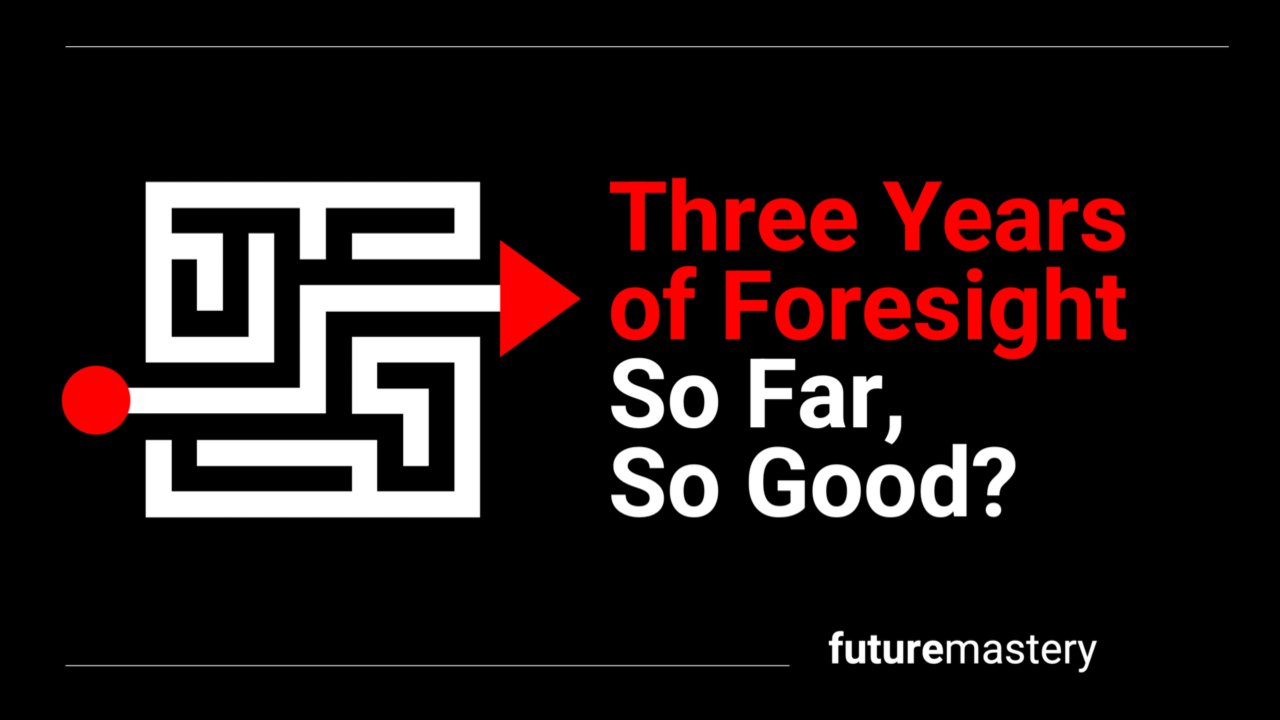Threading the Future: Everything Is Going According to Plan
Mar 31, 2025
How to foresee the future? All too often, it feels like trying to navigate through a perpetually changing labyrinth, crossed by lines of force that are like invisible Ariadne's threads.
Three years ago, when we launched FutureMastery, our project was rooted in a conviction—that we were standing at a historical crossroads—and in an ambition: to contribute to the creation of a unified theory of history. One that would integrate scientific analysis (cliometrics/cliodynamics) and various crowd psychology models (Strauss-Howe generational theory, Spiral Dynamics, and others), to help navigate the maze ahead.
As we outlined in our manifesto, we believed that the historic inflection underway would lead to significant troubles, particularly in the West—marked by a rise in populism and conflict, authoritarian temptations, and potentially even large-scale war—as we had anticipated in "Uncharted Territory". All of this set against a backdrop of medium-term but critical demographic and resource constraints. Before an even more significant anthropological shift triggered by technological acceleration—an idea we began to map out in our foresight synthesis, "The Day After."
Together, these traced the contours of a long period of crisis lasting into the late 2040s—what we called the Global Transition Crisis. A time demanding the adoption of antifragile strategies, the core principles of which we detailed in our "Mastering Antifragility" series.
Three years later, everything so far appears to be unfolding according to plan:
- As expected, the exacerbation of socio-economic challenges in the West and its financial forward flight have indeed led to rising populist tensions, strengthening authoritarian temptations, and the multiplication of conflicts. A rise in tensions reminiscent of the 1930s, following the classic pattern of secular crises identified by Strauss-Howe, as we noted in "Déjà Vu."
- As we anticipated, and given the convergence of generational and secular crises, all of this should lead to a drastic reconfiguration of the world order. A reconfiguration that has already begun with the inexorable rise of the BRICS and with a tipping of strategic dominoes at the very heart of the empire, with Trump's election in the USA. These upheavals—while still uncertain—herald a profoundly reconfigured world in the coming decade, as highlighted in "3 Shifts and a Dilemma."
- As we thought, the dilemma of strategic resources is still distant, but major maneuvers to prepare for it are multiplying: Chinese activism in Africa, Trump's designs on Greenland and Canada, geostrategic agreements on rare earth elements, etc. The technological race is accelerating with faster-than-expected breakthroughs in AI and quantum computing, and the rise of international competition, particularly Chinese, in this field. We highlighted these dynamics in "The Bannister Effect."
What scenarios for tomorrow?
While Trump's desire to refocus the American empire inward and shift global conflicts from the military to the economic terrain may space us—for now?—from the specter of full-scale nuclear war, the world is oscillating more dangerously than ever between rising protectionist tensions and worrying risks of regional conflagrations, particularly in the Middle East. Faced with the US withdrawal, Europe is stiffening. The decoupling between the West and the rest of the world is accelerating, creating profound risks of localized crises—even collapse—in a multipolar world becoming much more chaotic, but where the force lines of a new Yalta could nevertheless emerge.

In all these areas—though deep trends may be foreseeable—the human factor always has the potential to produce the unexpected. As Peter Turchin aptly notes in End Times (1), history unfolds through both long-term structural movements and short-term, chaotic individual and collective surges. This makes short-term events inherently unpredictable, even when the likely long-term direction is relatively clear.
In the medium term, structural challenges remain significant. While the coming years are milestones where everyone displays major ambitions (India 2047, China 2049, Africa 2063, etc.), and while the probable world of 2060 already promises to be very different from today's, the demographic and resource challenges that await us remain existential, as we highlighted in "Universe 25."
Faced with these challenges, technological evolution can be both a solution or an even more existential threat. Contrary to Spengler's perception, while technology has reshaped our environment, it has not altered human psychology thus far. The exponential progress of artificial intelligence could change everything. While these technologies are still in their infancy and only allow for replicating human modes of reasoning, their rapid progression could give rise to new forms of intelligence, as we anticipated in "Escape Velocity." We can already see the premises in certain experiments. Reality? Fantasy? It's still too early to say, but the possibility that humans might bring forth a new form of synthetic life can no longer be dismissed.
This could radically transform the future. A future that would no longer be guided just by human psychology, as we described in "Meta Humans," but also by artificial psychologies, emerging today, as discussed in "The Uncanny Valley." Hence the issues of human-machine convergence mentioned by Elon Musk, which could call into question all approaches to foresight to date. Perhaps AI psychology is a field that will need to be explored...!
We're not there yet. As often happens, even if the event horizon seems perceptible, we must guard against yielding to acceleration bias. History takes tortuous paths, and unknown factors can significantly alter its course. And the old financial adage applies just as well to foresight: "being too far ahead of your time is indistinguishable from being wrong."
More than ever, the future is constantly changing.
In the labyrinth, it will remain essential to hold onto the thread.
The next post in this new "Future Frontlines: Navigating the Forces of Change" series will be published mid April. Click here to subscribe >
(1) Peter Turchin is the founder of the groundbreaking field of cliodynamics, an innovative approach to social science that we explored in our post "History's Formula". His analysis of current societal trends is detailed in his latest book, "End Times". More at: https://peterturchin.com

